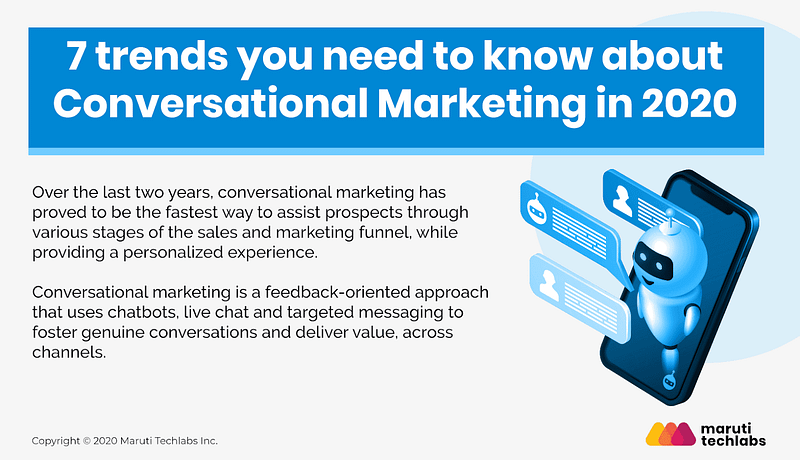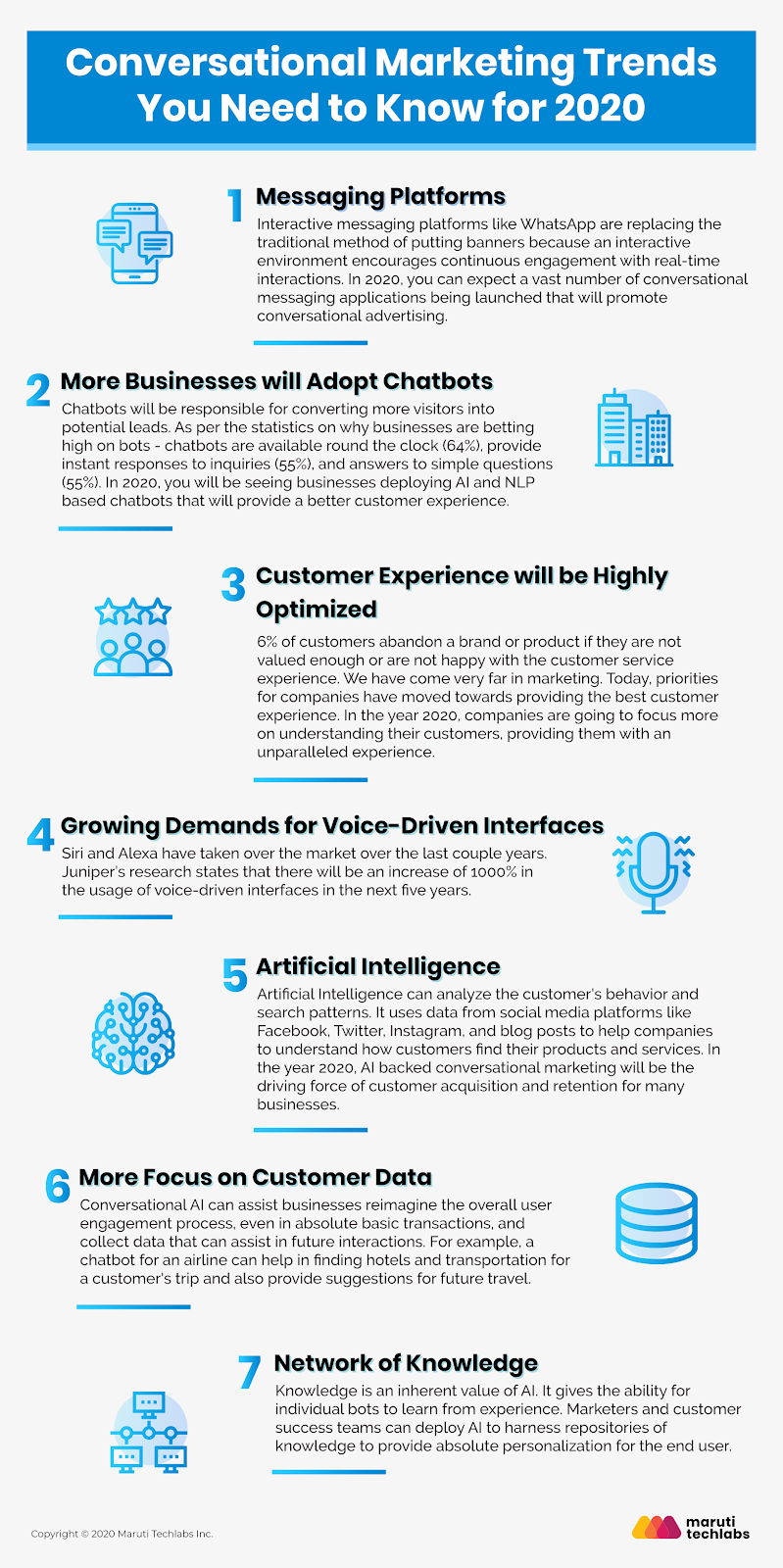Conversational Marketing Top Trends for 2020
What is Conversational Marketing?
Gone are the days when customers and prospects patiently combed through your entire website to find an email address, only to be reverted with ‘we will get back to you within x days.’
Today, customers are equipped with information at their fingertips. With so many options for better-informed customers, it has become challenging to retain and attract customers using traditional methods.
According to research, 82% of consumers look for an immediate response from brands.
Enter Conversational Marketing!
Conversational marketing is a feedback-oriented approach that uses chatbots, live chat, and targeted messaging to foster genuine conversations and deliver value across channels.
This has gone on to enhance customer experience, drive customer engagement, and develop customer loyalty. Still, more importantly, it has allowed businesses to generate more qualified leads, scale brand awareness, and support related tasks while saving time and resources.
What are the Benefits of Chatbot and Conversational Marketing for my Business?
Research says that more than 53% of buyers would probably buy from a business that they can communicate with, via message. Messaging as a channel is not just fast, but a whole lot easier and feels like a conversation for a lot of people. If you, as a business owner, are looking for ways to scale your marketing strategy (paid or organic) in 2020, conversational marketing through chatbots and live chat is the way to go.
If you think chatbots are suitable, just for customer support — think again! Support is only ONE way to leverage bots. With the right conversation design and configuration, the same bot can help in accentuating not only support but also engage prospects browsing through your website or social media, converting them to MQLs and SQLs, at scale. The best part? You can achieve this without increasing headcount.
1. Engage, Qualify and Generate More Leads
The beauty of chatbots is that they’re that one marketer that is always on. Giving your visitors a way to initiate conversations immediately, and get the answers they are looking for is bound to result in higher conversion rates, opportunities, and seamless experience.
Instead of having someone from Marketing qualify them and pass them onto Sales, the bot could ask a series of questions, collect necessary qualification details (name, email, company size, budget, service preference, their pain points and more), and based on their input, segment the users and personalize next steps. Marketing teams get to build their email list, and all boxes are checked, the Sales team gets a qualified lead with full context.
Conversational marketing is a one-to-one conversation to connect with leads. As stated above, it is all about building customer relationships and improving customer engagement. It uses intelligent chatbots to initiate a conversation with potential leads by providing human-like interactions. This approach helps in fostering long-lasting relationships with potential leads by directing them to the sales team. This approach uses chatbots to determine which points are more valuable and act accordingly.
2. Provides Valuable Insights About Customers
The traditional method of collecting contact information by distributing lead forms is not scaling anymore as they lack in providing context. Real-time conversations with customers will allow you to know more about the customer.
Context such as why the customer landed on your website in the first place, what they were looking for, and what product they are interested in can drive the entire business into a whole new direction. High intent leads can be passed directly to sales, with information on how much time was spent on the pricing page or Get A Demo page, if they are a repeat visitor who has expressed interest again, or if they happen to fit the ideal customer profile.
3. Provides a Better Experience to Customers
Wouldn’t it be nice if you had someone to guide you through your online shopping experience? Similar to how a sales rep guides you in a store. Conversational marketing provides this experience by integrating chatbots with the channels where bots allow for real-time conversations in terms of assisting with inquiries. You are creating a more human experience, as your website is no longer a generic set of pages filled with lead forms, you can now actually say “hello” and start conversing with hundreds of visitors at once.
4. Builds Customer Relationship
Conversational marketing reaches new customers on different channels and drives lead generation by giving the customer a more simple and easy way to get in touch with your business and start building some level of trust. As per the Harvard Business Review, messaging platforms provide a continuous engagement between customers and brands. This engagement makes conversations more natural and opens more opportunities to cross-sell, get input, and move back and forth between support as well as sales.
Beyond that, through an omni-channel approach, conversational marketing is one of the best ways to showcase your brand, its personality and create an authentic relationship with your target audience on the channel of their choice. With well-designed conversation flows, you can leverage copywriting, images, GIFs, videos, and more, to give your chatbot the personality it needs and reinforce your brand.
Why Does My Business Need a Conversational Marketing Plan?
Here are two significant benefits as to why a conversational marketing plan is vital for a brand’s success –
1. To Achieve the Ultimate Goal of Customer Engagement
Customer Service is the new Marketing. As of today, businesses everywhere are striving to provide anything but exceptional customer support to increase NPS and reduce customer churn.
This is where conversational marketing through chatbots can help. With interactions that come across as more conversational, and less transactional, customers tend to feel more valued as they are delivered content in a personalized and engaging way. More importantly, the overall user and conversational experience need to be well planned and thought out. The channel should be in line with marketing and support efforts to be effective.
2. To Draw a Line Between Marketing and Sales
There is a fine line between marketing and sales time. The marketing team helps in building customer relationships by incorporating a strategy to engage more and more customers. In contrast, a sales team enters the picture when you have established a relationship with the customer, and the customer is willing to buy the product or service.
Companies should define a transparent workflow to differentiate between the two. Companies should lay out the process to achieve the goal of the brand’s presence on a messaging platform.
Conversational Marketing Trends You Need to Know for 2020
As enter into the new year, it is a good idea to see how chatbot technology has fared so far and the conversational marketing trends that we can expect to see in the year 2020 and beyond –
1. Messaging Platforms
Interacting on messaging applications is as convenient and straightforward, as you are communicating with a friend. According to a survey, 73 trillion messages have been sent by people via chat applications. As per Business Insider, Apple handles about 40 billion iMessage notifications per day worldwide.
Interactive messaging platforms like WhatsApp are replacing the traditional method of putting banners because an interactive environment encourages continuous engagement with real-time interactions.
In 2020, you can expect a vast number of conversational messaging applications being launched that will promote conversational advertising.
2. More Businesses will Adopt Chatbots
Chatbots are very useful in squeezing the ROI from your marketing efforts. Chatbots are quite helpful in turning anonymous traffic into a prospect by identifying potential leads, initiating their interest in products, and cultivating the customer and brand relationship. As per the survey, companies that used chatbots have increased the visitor-to-lead conversion rate by 10%.
Chatbots will be responsible for converting more visitors into potential leads. As per the statistics on why businesses are betting high on bots — chatbots are available round the clock (64%), provide instant responses to inquiries (55%), and answers to simple questions (55%). In 2020, you will be seeing businesses deploying AI and NLP based chatbots that will provide a better customer experience.
3. Customer Experience will be Highly Optimized
Earlier, companies used to train their sales representatives on how to convince customers to buy that company’s products. It is found that 46% of customers abandon a brand or product if they are not valued enough or are not happy with the customer service experience.
We have come very far in marketing. Today, priorities for companies have moved towards providing the best customer experience. In the year 2020, companies are going to focus more on understanding their customers, providing them with an unparalleled experience.
4. Growing Demands for Voice-Driven Interfaces
Siri and Alexa have taken over the market over the last couple of years. Juniper’s research states that there will be an increase of 1000% in the usage of voice-driven interfaces in the next five years. Voice-enabled chatbots work similarly as the traditional text-based chatbots. The only difference is instead of typing your question or entering your input, you speak directly to the chatbot.
5. Artificial Intelligence
As per Techgrabyte, Artificial Intelligence will be one of the sectors that will open up vast opportunities for companies over the next few decades. Artificial Intelligence can analyze the customer’s behavior and search patterns. An intelligent chatbot is one of the examples of AI in practice. In the year 2020, AI-backed conversational marketing will be the driving force of customer acquisition and retention for many businesses.
6. More Focus on Customer Data
A formulaic question-and-answer scenario has prevailed for a very long time, but this approach does not provide customer satisfaction and often lacks in solving customer’s problems at hand.
Conversational AI can assist businesses to reimagine the overall user engagement process, even in simple underlying transactions, and collect data that can help in future interactions.
For example, a chatbot for an airline can help in finding hotels and transportation for a customer’s trip and also provide suggestions for future travel.
7. Network of Knowledge
Knowledge is an inherent value of AI. It gives the ability for individual bots to learn from experience. Marketers and customer success teams can deploy AI to harness repositories of knowledge to provide absolute personalization for the end-user. With bots being interconnected, and having access to vast pools of data, businesses can deliver personalized engagement in real-time, that connects with the user to provide real value.
To Conclude
In 2020 and beyond, businesses will need conversational systems to be the face of their brand, at large, and provide an omnichannel experience for its customers. In a world where content is king, and context is the queen, companies will need to focus on methods that can optimize customer interactions and provide a conversational experience that we are looking for.










